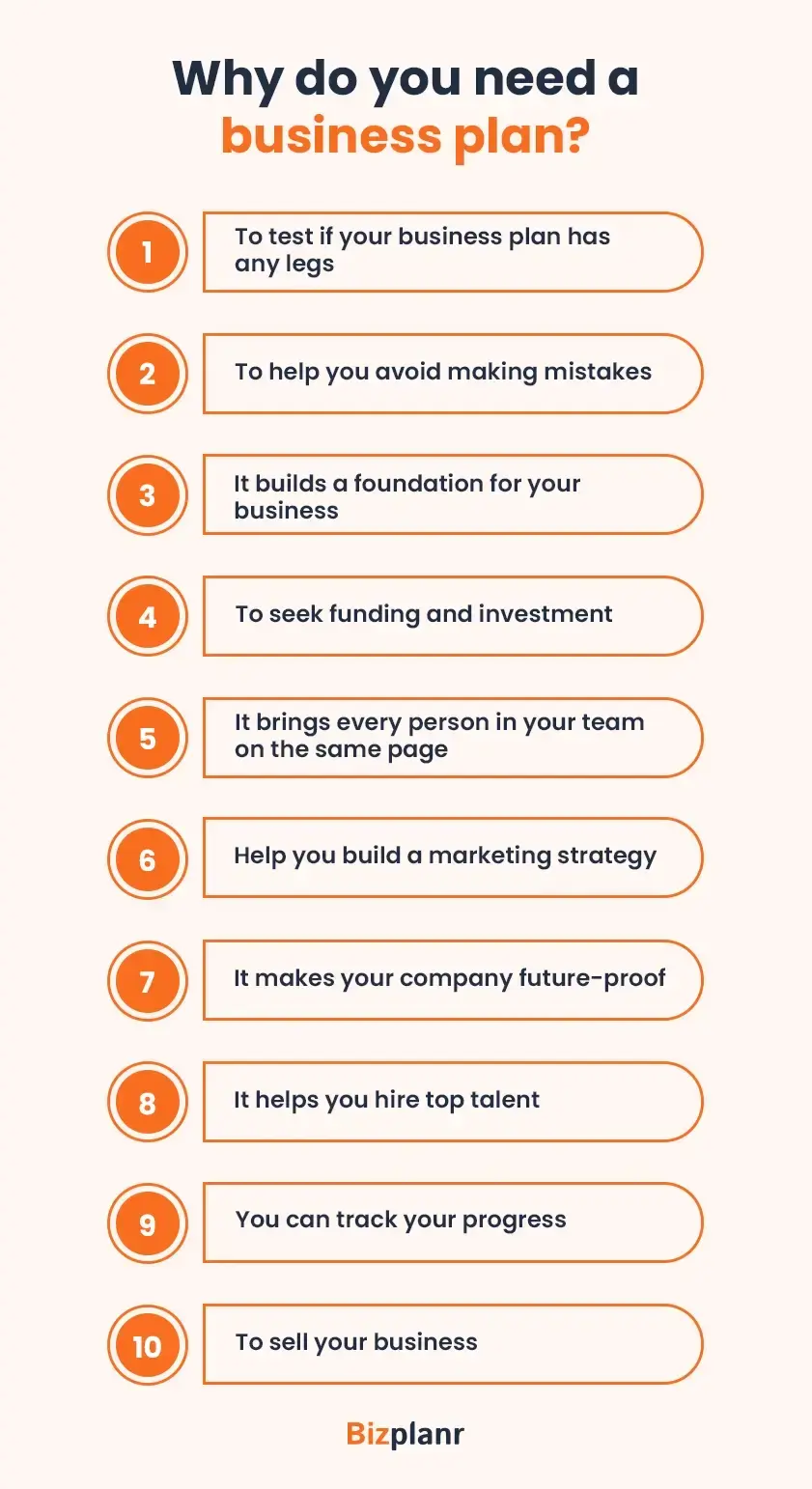16% of entrepreneurs who write business plans are more likely to make their ventures work compared to those without. Sean Hackney's story is a perfect example of this.
The plan he wrote detailed how he would take on his former employer, Red Bull North America Inc. Hackney's father, and a former Red Bull executive saw the plan and urged him to start his own business instead.
That unexpected advice led Hackney to co-found Roaring Lion Energy Drink, now a $6.2 million company. With an initial investment of just $62,000, he built the second-largest energy drink brand in bars and nightclubs. His business plan, refined over time, guided his remarkable journey.
If Hackney's success story hasn't convinced you of the power of a business plan, let us share ten practical reasons that might just change your mind.
10 reasons why you need a business plan
Writing a business plan is like creating a roadmap for your entrepreneurial journey. But it holds more power than you realize. Let's explore 10 compelling reasons why you should take the time to create a business plan.
Reason 1: To test if your business plan has any legs
You may think you have a fantastic business idea until you put it down on paper. That's when reality hits and aspiring entrepreneurs can test if their idea has legs.
When you start documenting your plan, you'll have to think about how you'll launch, how much money you'll need, and what kind of return you can expect. You'll probably hit a few roadblocks along the way, which is a good thing.
This is your chance to adjust your strategies and expectations before you jump in headfirst.
A business plan shows that you've done your homework. It reassures investors and partners that you're serious about your idea, and that you've put in the time to make it work.
Reason 2: To help you avoid making mistakes
Only half of all small businesses survive until their fifth anniversary.
Now this is a sobering statistic for a small business owner.
But the good news is that many of the most common reasons for failure can be tackled head-on with a solid business plan.
CB Insights data reveals that businesses often fail because:
- There's no market need for their product.
- They run out of money.
- They have the wrong team in place.
- There’s intense competition.
- There are pricing issues.
By writing a business plan you can avoid these pitfalls.
But how?
Let's say, you own a small coffee shop. Your business plan has helped you identify your target customers, set pricing, and forecast sales. But suddenly, a new competitor opens across the street. They are offering lower prices and a wider selection.
Now your plan acts as your survival guide here. With it, you can:
- Review your market analysis
- Re-evaluate your pricing strategy
- Develop a plan to differentiate your shop.
Or maybe you introduce a loyalty program, host live music events, and focus on sourcing unique coffee beans.
By regularly reviewing your business plan, you identify weak spots and prepare for the unexpected. You also establish financial guardrails. If you're not meeting your revenue goals, your plan helps you adjust spending, create realistic budgets, and keep your business on track.
In short, a business plan is your tool for turning uncertainty into opportunity.
Reason 3: It builds a foundation for your business
Let's say you're starting a company that creates educational apps for kids. There are endless possibilities. Simply stating "I'm starting an educational app company!" isn't enough.
You need to define your niche like:
- Which age groups will your apps cater to?
- What subjects will you cover?
- Why do kids need these specific apps?
Answering these questions helps shape your entire business strategy. Your initial research will guide your financial projections, goals, operational needs, and marketing efforts.
The benefit? You can constantly refer back to the goals outlined in your business plan to track progress and focus on areas that need improvement.
Only this way you'll spend less time fixing problems and more time engaging with your target audience—ultimately, leading to revenue generation.
Reason 4: To seek funding and investment
Every new business needs funding to get started. Banks don't hand out loans based on a simple request. They need to see a well-structured plan that clearly shows:
- How you'll use the money.
- Where it will go.
- How you plan to repay it.
Investors also need reassurance before they commit funds. They'll have questions about your pricing, revenue models, and overall financial strategy. A well-written plan will do more than just explain your business and goals to investors.
This will prove that you've done your homework and carefully considered the challenges your business might face. Moreover, it will demonstrate you have a deep understanding of the financial side of your business model—giving investors confidence in your ability to succeed.
Reason 5: It brings every person in your team on the same page
A great business plan does more than attract investors. It unites your team and gives everybody a clear understanding of where the company is headed and how to get there.
A study by McKinsey & Company proves this point. In companies with no plan, over half (51%) of executives were unhappy with their company's direction. It's clear: a shared plan matters.
But here’s the thing: Not just any plan will do. It needs substance. It needs to be well-thought-out and based on good research.
The same McKinsey study found that less than half (45%) of those surveyed were happy with their company's planning process. Only 23% said important decisions were even made using it.
This means a bad plan, or a plan that just sits on a shelf, can be as bad as having no plan at all. To benefit from a plan, it needs to be thorough, based on real information, and used to guide all the decisions a company makes.
Reason 6: Help you build a marketing strategy
A business plan isn't just about the numbers; it’s about your marketing plan too. It shows you the map to ensure that all the marketing roadways lead where you want them to—your business goal.
This helps you identify your target audience, and how you can effectively reach them.
A good business plan will also help you:
- Streamline all marketing efforts for you, saving you time and money.
- Keep your marketing strategies focused on what matters most—overall.
- Make the most out of your marketing budget by choosing the best ways.
- Truly understand your customers so you can give them what they want.
- Build a strong, recognizable brand.
Reason 7: It makes your company future-proof
Business plans aren’t just a tool that helps forecast the future. It shapes your future and helps you make wise decisions.
How? Take Alex, a tech enthusiast with an innovative app idea for an example. His business plan isn't just about predicting downloads.
It pushes him to analyze his competition: Who else offers similar apps? What makes his app unique?
This leads him to highlight his app's user-friendly interface and personalized features in his marketing, attracting a loyal user base.
When unexpected development delays arise, Alex doesn't panic. His plan includes extra time and money for unexpected issues.
This allows him to adjust his timeline without jeopardizing the launch. He even finds ways to team up with big tech companies, a strategy outlined in his plan for future growth.
However, the business plan isn’t cast in stone. It's a living document and should change according to trends. This flexibility lets businesses stay one step ahead. It turns challenges into opportunities and creates a future that's not just imagined but actively built.
Reason 8: It helps you hire top talent
Once you're done mapping your strategy in your business plan, you may come across areas that may need some additional skills. It could be a marketing strategy expert, a financial advisor, or a sales professional.
As a result, it helps you figure out exactly who you need to hire. It's like a checklist that shows you the different jobs that need to be done for your business to succeed.
By knowing these jobs, you can write clear descriptions helping potential candidates know exactly what’s expected of them.
Moreover, when you share your business plan with potential hires, it acts as a recruiting magnet. It attracts top talent by showing them that your ship is sailing towards success, not sinking. It’s probably because when you're sure of your company's direction, it's easy to get others excited about it too.
Reason 9: You can track your progress
Your business plan is not just a guidebook but also a report card for your company. You'll include things like:
- How much money you'll expect to make
- How you'll get customers
- What big steps you'll need to take.
They're not just guesses about the future, but targets that you're aiming for.
For example, financial reports will help you track your money. Are you making as much revenue as you predicted? Or are you spending too much?
Similarly, marketing plans will indicate your advertising and other promotional efforts. Are your ads reaching the right people? Are they visiting your website?
And the goals you set for your operations (like opening new stores or hiring employees) help you measure how far along you are in reaching those targets.
By checking how you're doing compared to what you planned, you can quickly find out if your business is working or not. This lets you make smart changes, avoid big mistakes, and keep your business on the path to success.
Reason 10: To sell your business
Selling your business is a big decision, and timing is everything. Your business plan can be a valuable tool in that process.
If you've set goals and business milestones within your plan, then you've created a timeline for yourself.
Eventually, when it’s time to sell, your business plan becomes a selling point. It demonstrates to potential buyers the success and future prospects that can affect your business's value.
Summing it up
You might hear stories of successful established businesses like Apple or Google starting without formal business plans. While those stories are inspiring, it's important to remember that these companies likely developed plans when seeking potential investors or going public.
After all, convincing others to invest in your idea won’t happen if you can’t pen your passion and success roadmap.
Of course, you don't absolutely need a written plan to succeed in business. But having one significantly increases your chances. Investors want to see your plan, and public companies need to share theirs to attract investors.
But we know writing a business plan can be hard. That's where AI business plan generator help. They can quickly create a plan based on a few details about your business, making the process much easier.
Get Your Business Plan Ready In Minutes
Answer a few questions, and AI will generate a detailed business plan.
Frequently Asked Questions
How does a business plan help small business owners with decision-making?
A business plan is like a map for your business. It clearly shows your goals, plans, and possible problems. This helps you spot challenges early on and find solutions before they become big problems.
Can a business plan help me solve problems unique to my industry?
Of course! Your business plan is as unique to you as a custom-made suit. It will deal with your business sector’s peculiar challenges and opportunities, whether you have to negotiate tough regulations, put yourself ahead of the trends, or outwit the competition.
I'm seeking investors or a loan. How can a business plan help?
Your business plan will be the investor's and lender's selling document. It’s proof that you’ve done your homework and have a definite plan for success. An effectively developed plan is what builds their confidence in your business and gives you the best shot at getting the funding you need.






